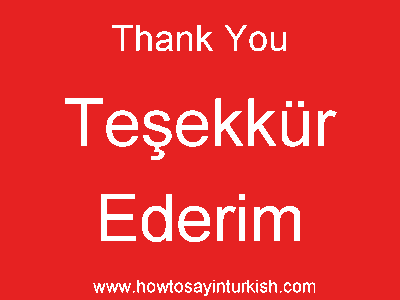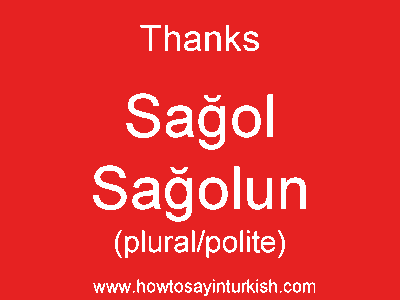How To Say Thank You In Turkish: A Comprehensive Guide
Learning how to say "thank you" in Turkish is an essential step for anyone interested in connecting with Turkish culture or traveling to Turkey. Whether you're planning a trip to Istanbul or simply want to impress your Turkish-speaking friends, mastering this simple yet meaningful phrase can make all the difference.
Turkish is a rich and expressive language with various ways to express gratitude. From formal settings to casual conversations, there are multiple phrases you can use to convey your appreciation. This guide will walk you through the most common expressions, their meanings, and how to use them appropriately.
Table of Contents
- Why Learn to Say Thank You in Turkish?
- Common Turkish Expressions for Thank You
- Formal vs. Informal Ways to Say Thank You
- Special Phrases for Special Occasions
- Pronunciation Tips for Beginners
- Responses to "Thank You" in Turkish
- Understanding the Cultural Context
- Conclusion: Start Expressing Gratitude Today
Why Learn to Say Thank You in Turkish?
Turkey is a country known for its hospitality and politeness. If you're visiting Turkey or the Turkish-speaking part of Cyprus (the north), or if you have Turkish friends, you'll quickly notice that most Turks are very polite and often express gratitude. Learning how to say "thank you" in Turkish not only shows respect for their culture but also helps build meaningful connections.
Moreover, expressing gratitude is a universal value that transcends language barriers. By mastering the art of saying "thank you" in Turkish, you demonstrate cultural sensitivity and a willingness to engage with the local community. This small effort can lead to lasting friendships and unforgettable experiences.
Common Turkish Expressions for Thank You
There are several ways to say "thank you" in Turkish, each suited to different contexts. Below are some of the most common expressions:
Teşekkür Ederim
This is the most widely used formal expression for "thank you" in Turkish. It is polite and appropriate in any setting, whether you're thanking a waiter, a colleague, or a stranger. The phrase "teşekkür ederim" literally translates to "I thank you" and is a staple in Turkish conversations.
- Nude Stars Game
- Remote Iot Vpc Ssh Raspberry Pi Aws
- Xvideo The
- Xxl Xxl Xl Pro 2024 T%C3%A9l%C3%A9charger
- Conchita Mart%C3%ADnez Wife
Sağ Ol
For more casual settings, "sağ ol" is a popular choice. This informal way of saying "thank you" is widely used among friends, family, and acquaintances. The word "sağ" means "alive," and "ol" means "be," so the phrase can be loosely translated as "stay alive" or "be well." It's a warm and friendly way to express gratitude.
Formal vs. Informal Ways to Say Thank You
Understanding the difference between formal and informal expressions is crucial in Turkish culture. Here's a breakdown:
- Formal: Use "teşekkür ederim" in professional settings, when speaking to elders, or when addressing someone you don't know well.
- Informal: Opt for "sağ ol" when talking to close friends, family members, or peers. It's a more relaxed and personal way to show appreciation.
Choosing the right expression depends on the relationship you have with the person you're thanking. Always consider the context to ensure your gratitude is conveyed appropriately.
Special Phrases for Special Occasions
Beyond the standard "thank you" expressions, Turkish has unique phrases for specific situations. Here are a few examples:
Eline Sağlık
This phrase is often used to thank someone for preparing a meal. Literally translating to "health to your hand," it acknowledges the effort and care put into cooking. It's a thoughtful way to express gratitude and is especially appreciated in Turkish households.
Teşekkürler
A simpler and slightly less formal version of "teşekkür ederim," "teşekkürler" means "thanks" or "thank you." It's commonly used in everyday conversations and is a great alternative when you want to keep things light and friendly.
Pronunciation Tips for Beginners
Pronouncing Turkish words correctly can be challenging for beginners, but with practice, you'll get the hang of it. Here are some tips to help you:
- Pay attention to vowel harmony, a key feature of the Turkish language. Vowels in Turkish words often match in sound, making pronunciation smoother.
- Listen to native speakers or use language learning apps to hear the correct pronunciation.
- Practice regularly, even if it's just repeating phrases aloud. Repetition helps reinforce memory and improves fluency.
Remember, Turks appreciate when foreigners make an effort to speak their language, so don't be afraid to try even if you're not perfect at first.
Responses to "Thank You" in Turkish
When someone says "thank you" to you in Turkish, it's polite to respond appropriately. Here are some common responses:
Rica Ederim
This is the most common response to "thank you" in Turkish. Translating to "you're welcome," "rica ederim" is widely used in both formal and informal settings. It's a polite and gracious way to acknowledge someone's gratitude.
Hiçbir Şey Değil
Another way to respond is "hiçbir şey değil," which means "it's nothing" or "no problem." This phrase is often used in casual conversations to downplay the significance of the favor or action being thanked.
Understanding the Cultural Context
Turkish culture places a strong emphasis on politeness and hospitality. Expressing gratitude is not just a social norm but a reflection of the values Turks hold dear. By learning how to say "thank you" in Turkish, you're not only acquiring a language skill but also gaining insight into the cultural nuances that make Turkey unique.
For instance, in Turkish households, it's customary to offer food and drinks to guests. Accepting these offerings with gratitude is a sign of respect. Similarly, acknowledging someone's kindness with a heartfelt "teşekkür ederim" or "sağ ol" strengthens the bonds of friendship and community.
Conclusion: Start Expressing Gratitude Today
Learning how to say "thank you" in Turkish is a simple yet powerful way to connect with Turkish culture. Whether you're using the formal "teşekkür ederim" or the casual "sağ ol," expressing gratitude shows respect and appreciation. By mastering these phrases and understanding their cultural significance, you open doors to meaningful interactions and enriching experiences.
We encourage you to practice these expressions and share your experiences in the comments below. Have you ever used Turkish to express gratitude? How did people respond? Your feedback helps us create better content for our readers. Don't forget to explore other articles on our site for more language tips and cultural insights!
Lastly, remember that learning a language is a journey, not a destination. Embrace the process, make mistakes, and keep improving. The Turkish-speaking world awaits your kind words and warm heart!
- Erika Tureaud
- Securely Connect Remote Iot Vpc Raspberry Pi Download Free
- Xxl Xxl Xl Pro
- Jim Acosta Net Worth
- Pining For Kim Trailblazer

How do you say "Hello" and "Thank You" in Turkish? : How to say in Turkish

Как сказать спасибо по турецки: 4 шагов

How do you say "Hello" and "Thank You" in Turkish? : How to say in Turkish